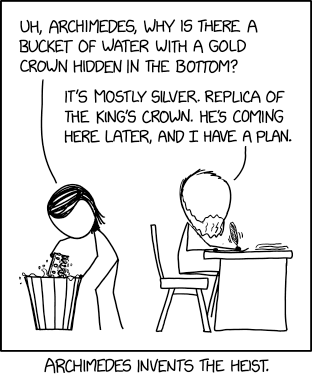Archimedes Principle

"I've always wanted to run naked through town, but I don't want to get in trouble with the king or be remembered by history as a weirdo. I wonder how I could ... EUREKA!"

"I've always wanted to run naked through town, but I don't want to get in trouble with the king or be remembered by history as a weirdo. I wonder how I could ... EUREKA!"
Archimedes was a foundational mathematician and scientist who lived in the 3rd century BCE. It was recorded that he was tasked by his tyrant king, Hiero II of Syracuse, with determining whether a votive crown made by a local goldsmith actually contained all the gold the king had provided for it, or whether the goldsmith had substituted an equal weight of silver for the more-valuable gold. Archimedes knew he could solve this problem if only he could compare the crown's weight to its volume; since any silver in it, being only about half as dense, would occupy more volume than the gold. Despite knowing this, Archimedes didn't know how to measure the volume of the crown, which was highly irregularly shaped. According to legend, as Archimedes was getting into a bath one day, the bath overflowed. Archimedes realized that the volume of water displaced by any immersed object, including his body and the crown, was equal to the submerged volume of the object, and thus he could establish the crown's volume; a crown made with substituted silver of equal mass would displace more water than the supposed gold version would. This insight led him to solve the king's problem (and determine that the goldsmith had in fact cheated the king out of some gold). Legend also says that upon having this insight, he went running naked down the streets of Syracuse shouting "eureka!", Greek for "I have found it!" - a word now associated with sudden insights.
In the comic, Archimedes' insight doesn't involve science, but is a plan for self-enrichment. Evidently, he has concealed a less-valuable gold-plated or gold-alloy crown in the tub of liquid, and plans to swap it for the real crown when 'measuring the volume'. This implies that the king's crown turns out to be, in fact, pure gold, but Archimedes will report it to be adulterated with silver, in order to steal the gold crown for himself. This is claimed to be the invention of the heist. While theft has no doubt existed since property has existed, a "heist" implies a complex plan, often based on deception and carefully planned operations, as is typical of heist films.
The title of the comic, "Archimedes Principle", refers to a different but related insight of Archimedes, that the upward buoyant force that is exerted on a body immersed in a fluid is equal to the weight of the fluid that the body displaces. It may also relate to the particular twist of morality being observed by this version of Archimedes, in that it seems not to be against his principles to defraud a king, and (incidentally?) besmirch a particular master-craftsman.
According to the title text, Archimedes's eureka moment wasn't when he discovered how to measure the crown's volume, but when he realized that he could use this discovery as a pretext for running naked through town, something he'd always wanted to do.